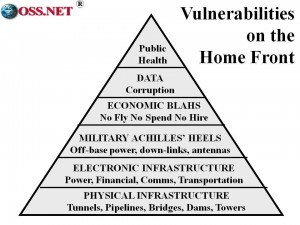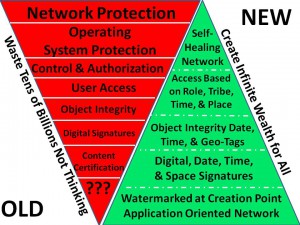
This is about de-centralising the net, distributing the data to the periphery where it's needed, rather than running everything through big data pipes and central servers…
HTTP is obsolete. It's time for the distributed, permanent web
HTTP is broken. It's time for the distributed, permanent web. The InterPlanetary File System (IPFS) is a new hypermedia distribution protocol, addressed by content and identities. IPFS fundamentally changes the way we look for things, and this is it's key feature. With HTTP, you search for locations. With IPFS, you search for content. IPFS is still in Alpha release, but you can find out more here

ROBERT STEELE: The complete post above is highly recommended. It does a marvelous job of deconstructing HTTP as a flawed web — an archipelago of walled gardens badly maintained by one and all concerned. It must be said that HTPP was and will remain for some time a world-changing accomplishment equal to the Gutenberg Press. What the IPFS write-up does not do is present all the flaws in the Alpha concept, nor does it address the educational, decision-support, and research aspects (holistic analytics and true cost economics), or the open source everything engineering that is the only way to avoid what Stephen E. Arnold calls “technical debt,” or in plainer terms all too familiar to IBM and Google, “a losing proposition where revenue does not match expenses over time.” I asked a few of our contributing editors to comment, below are their preliminary views. Of particular note is their view that this initiative, once fully developed, will not be subject to NSA, Google, or Goldman Sachs back doors and data corruption such as I warned about from 1998 onwards. We've wasted a quarter century and trillions of dollars because of a reluctance on the part of the mandarins in both government and the private sector to LISTEN, and to do the right things instead of the wrong things righter. I end with a tribute to Robert Garigue (RIP), whose work I have sought to preserve here at Phi Beta Iota.


Neal Rauhauser: IPFS is a fusion of bittorrent, a high volume, censorship proof means of distributing digital content, and a couple of other technologies – more interestingly the blockchain concept, and git, which is a software version control system.Once IPFS has taken root on a large scale it will be possible to publish content, have it distributed globally so its impossible to root out, and it'll be subject to the same security as the Ethereum blockchain provides.Looks very good, has both a polished face and something one can download. Next step in validating it would be checking the contributors – some projects are FOSS, but a single company's stalking horse, while genuine efforts have breadth and depth of involvement.I suspect it's on the right side of things, given the places I've seen the acronym appear prior to this.
- IPFS is a file system with hashes being used as pointers to actual data, with a directory system to map those hashes to actual services. This is akin to Tor's hidden services, as far as finding things, but there is no concealment offered.
- IPFS does not protect traffic in flight beyond using TLS (latest SSL), which is pretty good, but … could be done better.
IPFS does not protect one's location the way Tor does, although the protocol appears it could be encapsulated and used via Tor. - IPFS does nothing more to protect the data it mirrors once its saved on the local disk. There is no encryption unless the content was shipped in encrypted form.

Sean Brizendine: I would agree that HTTP is indeed obsolete. I do not agree that it will disappear or be housed only on the servers like the ones Brewster Kahle and Jordan Modell are using at the Internet Archive as Kyle basically referred to. Also I believe the NeoCities of the future will be less about Geographical area and more prone to consensus and belief systems. Everything else Kyle speaks is absolutely the truth.There will be a lot of private networks which will be built as layers. These layers will be decentralized and distributed through nodes which communicate or basically compete with each other within their own peer to peer network with the more peers the faster the network. An example would be Skype pre-Microsoft say 2009 only times a million. Namecoin or Better yet EmerCoin could be an example of this being built now. Bitcoin is the strongest network however the most useless of the current Blockchains, because its network is not designed very well for this type of expansion within its Blockchain and this is the reason why Mastercoin,[1] and others built their various side chains on top of the Bitcoin node and they themselves serve as individual layers that communicate with Bitcoin plus independently with their own chains and Token Assets/Smart Contracts. These along with other peer to peer Networks will be the preferred networks to use each serving their own purpose or multiple purposes. There will be hybrid networks such as PayServices [2] and closed Networks. The internet that we know today will be a seedy, lawless and very small part of the existing world wide web of the future. The gateways that connect to the internet of things will be harder for some to connect to. Reputation will become everything. It is very well possible that all this will exist inside something like Tau-Chain [3][4][5][6] Ethereum [7][8] holds some promise just not sure how it will fit in and according to the Tau-Chain Developer it will not fit in to this future system. I have a friend thats building a multi 7 Layer comprised of individual Blockchains with Multiple Algorithms including Cuckoo and Momentum with multiple layers of individual side chains on top of each blockchain all communicating with each other and fueled by one or multiple tokens that will be used a DeCentralized Distributed Open Source megachain providing distributed VPN/VPS and DNS like Namecoin and EmerCoin [9][10][11] with the DNS outside of ICANN in which the more tokens that you feed into the system, the more Broadband and targeted traffic will be brought to each independent VPN/VPS/DNS or website or vise versa people can sell their Broadband and or web traffic to any address within the Network.However just because I know all or most the lead developers of these various projects it still is only speculation on my part to guess how they will all fit in or if they make it. My guess is from what I know and have seen is that they will. We are talking about no more DDoS attacks, nobody can dismantle these Networks of peers, no kill switch and Governments will have little to no say or influence in these matters. Another bit I am watching is Storj [12].
Notes:
1. https://en.wikipedia.org/
2. https://www.payservices.
3. http://www.tauchain.org
4. http://tauchain.org/
5. http://www.idni.org/
6. https://bitcointalk.org/
7. https://en.wikipedia.org/
8. https://www.ethereum.org
9. http://emercoin.com
10. https://en.wikipedia.org/
11. http://themerkle.com/news/
12. http://storj.io

Ty Simpson: I think the deeper message here is the one I've been trying to make. People keep assuming that we're getting closer to machine intelligence; they are oblivious to the concept that it already happened! The IOT, Open-Source, and now Blockchaining, have multiplied the Inter-Galactic-Computer-

Robert Garigue: With a salute to Buckminster Fuller (do more with less) and Russell Ackoff (do the right things, not the wrong things righter) I would simply point to the graphic below. It has been circulating for over a decade and there is not a single information technology company that is remotely conscious of their potential along these lines. IFPS is a good start, it needs to be radically expanded and the planning done beforehand toward how we achieve 100% data entry in all languages and mediums (voice to text will obviously be important), 100% geospatially-ground near-real-time processing, tools for thinking, and extreme democracy across all domains from governance to work.




